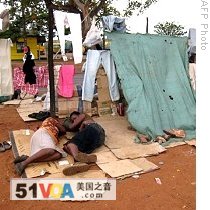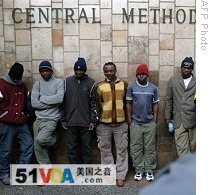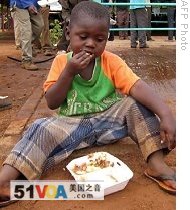Musina, South Africa
18 February 2009
 |
| Zimbabweans rest in makeshift homes at showgrounds in Musina, 17 Dec 2008 |
It is morning at the Musina town showgrounds, a cluster of brick buildings and sheds on a sprawling field meant to host agricultural fairs. Shelters made of cardboard and plastic sheeting are scattered across the grounds. Food in tin cans simmers over cooking fires.
Thousands of people have gathered at a fence behind which stand a group of vans, a mobile registration center set up by the South African government.
This is the first stop in South Africa for many of those fleeing the crisis in Zimbabwe.
Mike Dziva, a 23-year-old mechanic, has made it inside the gate and is in line to register for political asylum.
"I left Zimbabwe because there are some hard conditions," Dziva said. "One is due to political violence, political instability. And then health care is very poor. People are dying of cholera. Even education. The schools are closed until now."
 |
| Refugees, mostly from Zimbabwe, stand outside the Central Methodist Church in Johannesburg, 30 June 2008 (file) |
Seventeen-year-old Ray Shumba is one such victim.
"I was with my brother. So we went through the river and when we were coming through in Musina, we met some of the gumaguma's," Shumba said. "And they took all of our clothes and money, everything we had."
Many applicants are desperate to get inside the fence and begin their registration. People caught without documents are picked up by the roving police vans and deported.
The manager of the mobile registration center, Sakhile Dlalisa, says his staff can only handle 300 applications per day.
"We are under pressure because we are having nine officials working here," Dlalisa said. "If we had more capacity, having additional staff members and also resources, trucks and additional computers or work stations, we could process more."
His staff has registered more than 60,000 people, mostly Zimbabweans, since the center was set up six months ago. But more than 2,000 applicants are still waiting to file and more arrive each day.
Dlalisa says 95 percent of the Zimbabwean applicants are rejected because the South African government considers them to be economic migrants looking for a better life, rather than political refugees fleeing a repressive regime.
But this does not deter them because they know that the rejection can be appealed.
Many people, once they receive their papers, move on to major cities or farms in the interior. Often they seek relatives or friends who can help them.
One of the most graphic signs of the Zimbabwean crisis is the epidemic of cholera, an easily preventable and treatable disease that has killed several thousand people in Zimbabwe in recent months.
The disease has spread across the border with the refugees, infecting several thousand people in South Africa and killing more than 50.
The Doctors Without Borders charity this week warned that the epidemic could spiral out of control in Zimbabwe. One of its physicians in Musina, Fabrizio Ferli, says cholera is still a threat in South Africa.
"The epidemic is not finished in Zimbabwe and it should not be considered finished in this area," Ferli said. "We are still seeing cholera cases here. We are taking samples and considering as cholera patients all the acute watery diarrhea we are finding here at the moment."
He says cholera is the most visible sign of Zimbabwe's failed health services. There are also many cases of malaria, tuberculosis, and HIV/AIDS.
Some refugees cross the border looking to further their education because most of Zimbabwe's schools are closed.
Aid groups have placed 250 school-age children in local schools, but most go to informal classrooms in the camp with volunteer teachers.
Aid workers say they are worried about 1,500 unaccompanied children with no family who are considered especially vulnerable to exploitation as child laborers or sex slaves.
 |
| A young Zimbabwean boy eats a meal at the showgrounds in Musina, 17 Dec. 2008 |
Agnes Moyo has been bringing her six-month-old baby to the center after crossing the border with her husband and two other children. She says she left home after supporters of President Robert Mugabe's ZANU-PF Party badly beat her father.
"I cannot go back to Zimbabwe because I cannot. I cannot because I have seen so many consequences, so I cannot go there," Moyo said.
There is little food and most refugees sleep out in the open. It is a tough existence. But they get by on hope and survival skills. Whatever their reason for leaving home, virtually no one plans to return.